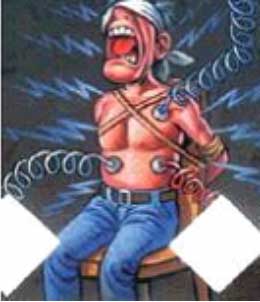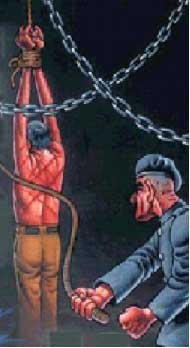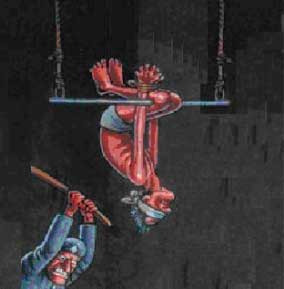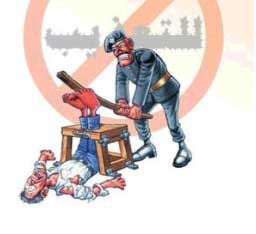Introduction
There has been series of flagrant human rights violations recently in Syria, including the mass killing of prisoners in Sidnaya prison and the killing of three Kurdish citizens who were celebrating Norouz (New Year) in the city of Kamishli.
Following are excerpts from reactions to these events on oppositionist Syrian websites, as well as details and illustrations from reports posted on these sites about the torture of prisoners in Syrian jails.
The Sidnaya Mass Killing
On July 5, 2008, Syrian oppositionist websites and human rights organizations reported that least 25 prisoners had been killed by security forces during rioting in Sidnaya prison. [1] After two days of silence from the government, the official Syrian news agency SANA confirmed that "prisoners convicted of terrorism and extremist acts" had rioted, that security forces had taken steps to "restore the peace," and that legal action had been brought against the rioters. [2] To date, however, the Syrian regime has not acknowledged that any prisoners have been killed, nor has it allowed the prisoners' families to visit the prison to find out what befell their relatives.
The Damascus Declaration Organization: "The Regime is Responsible for the Tragedy in Sidnaya Prison"
An article posted July 12, 2008 on the website of Damascus Declaration, an umbrella organization of oppositionist forces in Syria, blamed the Syrian regime for the mass killing, and criticized the international community for keeping silent about it:
"A week has passed since the events at Sidnaya prison, and the details of what happened there have not yet been fully disclosed. The regime and its security apparatuses are to blame for the tragedy, owing to their use of excessive force and live ammunition.
"Even if some of the prisoners did perpetrate violent acts - and that is not very likely - their incarceration in this prison is questionable to begin with... since they were arrested under the Emergency Law, [i.e.] without due process. Moreover, some of them were tried by the Emergency Court, which violates legal principles and whose existence is insupportable. In the jail [itself, the prisoners] receive inhuman treatment and are held in inhuman conditions - the most recent [example of which was the] ban on visits from their families...
"First, [we] condemn the government's refusal to disclose the number and names of the victims, as well as the general [information] blackout it has imposed on this affair, which gives rise to confusion, alarm and chaos. An independent, unbiased investigation of the massacre is imperative... [Furthermore,] we ask the world to take a firm stand on human rights [in Syria], since this is our legitimate right." [3]
Syrian Columnist: "The Sidnaya Massacre - A [Mirror] of Syria's Entire Domestic Situation"
'Abd Al-Baset Sayda, a Kurdish Syrian columnist who resides in Sweden, wrote on the oppositionist Syrian website Levant News that the Sidnaya prison incident mirrored the situation in Syria as a whole: "The difference between the crime that took place in Sidnaya prison and the crimes that occur in the numerous other prisons, either secret or non-secret, erected by the gang that rules Syria... is that the news of the crimes [in Sidnaya] reached the press after the jailors lost control and could no longer bully people into silence as they had always done. Consequently, they were compelled to ask for help [from forces] outside the prison to suppress [the prisoners], which led to the killing and wounding of dozens of victims...
"Sidnaya prison today is a microcosm of Syria's entire domestic arena. A regime armed to the teeth that controls the capital and the media looms over victims who have no option but to staunchly stand up for their honor and insist on their [right] to hope for a better future.
"This is a regime that starves [people], usurps [their] freedom, and kills [them]... It is a regime that has brought people to bankruptcy [by] forcing them [to endure] horrifically high prices, in order to keep everyone constantly preoccupied with making an honest living. This enables [the regime] to tighten its hold over the country and over Syrian society, and to thwart every possible threat to the continuation of its dictatorial rule." [4]
The Killings in Kamishli
On March 20, 2008, the Syrian security forces opened fire on Kurdish citizens who were celebrating Norouz (New Year) in the city of Kamishli, killing three and wounding five. Eyewitnesses gave conflicting reports as to the reason for the shooting. Some claimed that the three had been shot without provocation, while others maintained that the celebrators had burned tires and thrown stones at policemen. Following the incident, several Kurdish organizations in Syria announced a period of mourning and the cancellation of Norouz celebrations. [5]
The Syrian regime completely ignored the incident, but Kurdish forces inside and outside Syriareacted in anger. The president of Iraqi Kurdistan, Mas'oud Barazani, harshly condemned "the shooting, during the [Norouz] festivities, of innocent people whose only crime was to express their joy at the birth of the Kurdish new year." Barazani called on Syrian President Bashar Al-Assad "to intervene in order to prevent the recurrence of such crimes, and to conduct an investigation in order to discover the identity of the perpetrators and bring them to justice." [6] Al-Assad responded in an interview for the Qatari daily Al-Watan, saying that Barazani should "deal with Iraq's [affairs], not Syria's," and that "Barazani had nothing to do with any Syrian citizen." Al-Assad went on to say that "[the Syrian government] was responsible for Syrian citizens, and was fully capable of carrying out investigations and defending [its people]." [7]
Kurdish Columnist: The Shooting Was Meant to Kill Syrian Freedom Even Before It Was Born
In an article on the Kurdish website www.welate-me.com, Serdar Badrakhan, a Kurdish columnist residing in Syria, wrote that high-ranking Syrian officials were responsible for the Kamishli shootings:
"Is there any state on the face of the earth [other than Syria] that fires live bullets at its citizens during their festival?! Is there any [other] state that harbors so much resentment toward citizens who want only justice, equality, and an end to the policy of apartheid against them? Is there any [other] state, in this day and age, that places such a low value on its citizens and their lives, [and treats them] with such depravity and contempt? How can it be that people are brutally massacred, [yet] the perpetrators of these shameful crimes against humanity are not subjected to any legal or criminal investigation?! What right does [the state] have to guillotine Kurds who only wanted to be treated first as human beings and then as citizens?!
"What more does the regime want from us?! We live on the land that has belonged to our ancestors for thousands of years, yet you do not recognize our existence or our right to live... Have you forgotten that the truth cannot be concealed forever? We will stay on our land and will not forsake it, despite your policy of oppression, physical aggression, and killing. We will continue to live on it, hungry and barefoot; we will eat its herbs and shelter in the shade of its rocks and trees; and we will not go away!... Do you want our people to give up their Kurdish identity?! Do you want to bring them to their knees?! [If so,] you are making a grave mistake... Your plans and your policy cannot undermine the self-respect and the pride that have always distinguished our people. We are certain that the day will come when, alive or dead, you will be held to account for the crimes you have perpetrated against our people.
"We believe that those hate-ridden bullets were fired... on orders from high-ranking officials, and we firmly demand that their [idenity] be revealed and that they stand trial. [Those bullets] were meant to kill the nonexistent freedom in Syria and to bury it before it could even be born. [They] were meant to thwart the Syrian people's [hope] for nonviolent, gradual democratic change, as well as the rapprochement between all national and ethnic groups [in Syria] and their joint activity - so that the [regime] can carry on oppressing everyone, plundering the riches of the land, and [depriving] the people of their livelihood." [8]
Kamishli Resident: "Syria Will Not Achieve Stability by Firing On Its Citizens"
In an article on www.alarabiya.net, Hawas Mahmoud, a Kurdish columnist residing in Kamishli, called to extinguish the flames of nationalism in Syria before they engulfed everyone: "We ask with bitterness: How can Syrian national unity be strengthened? How can the Syrian homeland be built? [Will it be built] through oppression, prisons, random shootings, the murder of national identity, and the slaughter of innocent unarmed civilians? [Will it be built] by sanctioning corruption and bribery, destroying infrastructure, suppressing freedoms, and gagging people? Or [will it be built] through dialogue, democracy, elections, public participation, freedom of expression, a modern party law, construction and development?... If sensible people in Syria... wish for a stable country, they must extinguish the flames of chauvinism before they engulf everyone. Negation of the other is tantamount to a suicide of the nation. The examples are numerous, ranging from Kosovo to Iraq, Sudan, etc...
"It is no longer possible [for the regime] to boast about [political] stability [in Syria]. To those who claim that Syria enjoys stability, I say: Syria will not achieve stability by firing on its citizens. You chauvinists are steeped in illusion if you believe that you have the power to extinguish the blaze of Norouz that lives in the hearts and minds of the Kurds.'" [9]
Torture in Prisons
Syrian oppositionist and human rights websites periodically post articles on torture in Syrian jails. A July 2007 report by the National Human Rights Organization in Syria states that a variety of methods of physical and mental torture are used in the prisons, especially during preliminary investigation. The report stated that these include using the torture chair; torture by means of water or electrical shock; extinguishing cigarettes on the prisoner's body; beating with metal cables; using the torture wheel; hitting, kicking, and slapping; beating the soles of the prisoner's feet, humiliating the prisoner and using abusive language; binding the prisoner's arms, and blindfolding. [10]
Former Political Prisoner: "The Syrian Regime Is Committing Crimes Against Humanity"
Syrian human rights activist George Salim recounts the torture he endured in a Syrian jail: "I wonder if the walls of Prison Dungeon No. 13, Section 235 - known as the Palestine section, and notorious for its torture and maltreatment [of prisoners] - still reverberate with my screams and groans. Inside these walls I spent 120 days, to the hour, during which I was subjected daily to barbaric torture, [which made me] beg for death thousands of times a day. [Only] then did I understand how merciful death really is.
"I apologize to the reader for recounting what befell me personally and for dwelling on my own experience. Nevertheless, I am determined to get it off my chest, [and hope] that this article will reveal to the reader the crimes against humanity committed by Syrian intelligence...
"Everyone knows that governments throughout the world collect taxes from the people in order to build schools, pave roads, improve their citizens' standard of living, construct hospitals and rehabilitation centers, and advance development programs. The Syrian regime, however, acts in exactly the opposite way. Public funds and taxes go towards the intelligence budget, and are used for opening new security branches and jails, devising novel methods of torture, and filling the dungeons and detention centers with citizens and humiliating them...
"A [prison] officer shamelessly orders his subordinates to torture a prisoner, and personally supervises the proceedings. Most of these people have become sadists who enjoy torturing the detainees. They have become addicted to it, and practice it on a daily basis.
"Slapping and spitting in [the prisoner's] face, abusive language, blows to the head, punches in the face, hitting, shackling [the prisoner's] feet, using the torture wheel, administering electrical shocks to sensitive body parts, suspending [the prisoner] from the ceiling, raping [him]... starving [him], urinating on [his body] - this is only a partial list of [torture] methods practiced daily, regularly and in a well-organized manner in the detention centers and jails of the Syrian intelligence [apparatus]...
"I have never been a political enemy of the Syrian regime, or [even] a member of a political party; neither have I carried out hostile acts against [this regime]. I only became somewhat interested in improving human rights in Syria, [seeing this] as a voluntary service to the regime, and nothing else. Nevertheless, I came to be regarded by it as a traitor, was followed, arrested and subjected to torture and persecution, and besieged from all directions.
"What would have happened if I had really been a political dissenter? What punishment would I have incurred then? This regime understands only the [language of] arrests, torture, intimidation, and humiliation of the citizens, aimed at protecting itself from collapse. [Nevertheless,] I am convinced that its days are numbered." [11]
Syrian Oppositionist: Torture Is Part of Syrian Reality
In another article posted on Levant News, Syrian columnist and human rights activist Muhammad 'Ali 'Abdallah wrote that Syrian citizens had no choice but to succumb to the reality of torture: "Although the Syrian constitution (Clause 28, Subsection 3) and penal code prohibit torture, and although in 2004 Syria endorsed the U.N. charter forbidding torture, it is still known as one of the countries where torture is used in an organized fashion in detention centers and jails. Besides, torture is regarded as one of the [accepted] punishments.
"There is no point in discussing torture without talking about Syrian prisons and detention centers [in general]. The Syrian authorities are notorious for violating human rights... They alone are responsible for [the fact that] their names are associated with torture and human rights violations. There are two main reasons for this. First, they do not allow prosecution of torturers, anchoring their immunity in legal rulings... Second, the government refuses to allow independent observers access to prisons and detention centers...
"In Syria, the authorities continue to conceal all acts of torture, to refuse negotiations with human rights organizations that are concerned about this issue, to evade the responsibility of investigating cases that have been exposed, and to implement laws protecting intelligence personnel from indictment. [As a result,] Syria is included in the list of countries that use torture, and any citizen wishing to sue his torturers is denied the right to do so. This leaves them no [choice]... but to submit to the status quo and keep silent." [12]
Illustrations: Torture in Syrian Jails
The website of the Syrian Human Rights Committee (www.shrc.org ) published a series of illustrations portraying torture practices in Syrian jails:




"No to Torture"

*O. Winter is a research fellow at MEMRI.
[1] www.shrc.org, July 5, 2008.
[2] Al-Thawra (Syria), July 7, 2008.
[3] http://annidaa.org, July 12, 2008.
[4] www.thisissyria.net. July 8, 2008.
[5] www.thisissyria.net, March 21, 2008. Further violations of Kurds' rights in Syria followed the Kamishli killings. On September 14, 2008, the Damascus Military Court sentenced 50 Kurdish citizens to six months in prison for participating in a June 2005 protest against the abduction and murder of Kurdish Sheikh Mohammad Ma’ashouq al-Khaznawi by Syrian authorities. www.thisissyria.net, September 14, 2008.
[6] www.elaph.com, March 22, 2008.
[7] Al-Watan (Qatar), April 27, 2008.
[8] www.welate-me.com, March 22, 2008.
[9] www.alarabiya.net, March 25, 2008.
[10] www.thisissyria.net, July 6, 2007.
[11] www.syriahr.com, November 13, 2007.
[12] www.thisissyria.net, October 7, 2007.




